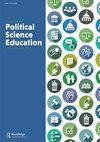Survival!: A Portable Simulation That Encourages Failure
IF 0.6
Q3 POLITICAL SCIENCE
引用次数: 0
Abstract
Abstract This single-lesson simulation is designed to allow students to explore concepts related to bargaining, credible commitments, and the security dilemma in an anarchic environment. The simulation is designed assuming about 20 participants, divided into 4 groups, but is easily modifiable for either more groups or more participants. The goal of each group is resource acquisition, and a failure to acquire adequate resources can result in the elimination of group members from the simulation. Resource acquisition can be done either cooperatively or competitively. The design of this particular simulation is structured to make failure probable for a sizeable minority of participants. This design choice is intentional, as the simulation seeks to turn failure into a pedagogical device. Along with presenting the simulation itself, the piece also argues for the pedagogical merits of designing for failure in classroom exercises.生存!:鼓励失败的便携式模拟
这个单课模拟旨在让学生探索在无政府环境中与讨价还价、可信承诺和安全困境相关的概念。模拟的设计假设大约有20个参与者,分为4组,但很容易修改为更多的组或更多的参与者。每个小组的目标都是获取资源,如果不能获得足够的资源,就会导致小组成员从模拟中被淘汰。资源获取可以通过合作或竞争两种方式完成。这种特殊模拟的设计结构使相当大的少数参与者有可能失败。这种设计选择是有意的,因为模拟试图将失败转化为一种教学手段。除了展示模拟本身,这篇文章还论证了在课堂练习中为失败而设计的教学优点。
本文章由计算机程序翻译,如有差异,请以英文原文为准。
求助全文
约1分钟内获得全文
求助全文
来源期刊

Journal of Political Science Education
POLITICAL SCIENCE-
CiteScore
1.80
自引率
36.40%
发文量
69
期刊介绍:
The Journal of Political Science Education is an intellectually rigorous, path-breaking, agenda-setting journal that publishes the highest quality scholarship on teaching and pedagogical issues in political science. The journal aims to represent the full range of questions, issues and approaches regarding political science education, including teaching-related issues, methods and techniques, learning/teaching activities and devices, educational assessment in political science, graduate education, and curriculum development. In particular, the journal''s Editors welcome studies that reflect the scholarship of teaching and learning, or works that would be informative and/or of practical use to the readers of the Journal of Political Science Education , and address topics in an empirical way, making use of the techniques that political scientists use in their own substantive research.
 求助内容:
求助内容: 应助结果提醒方式:
应助结果提醒方式:


